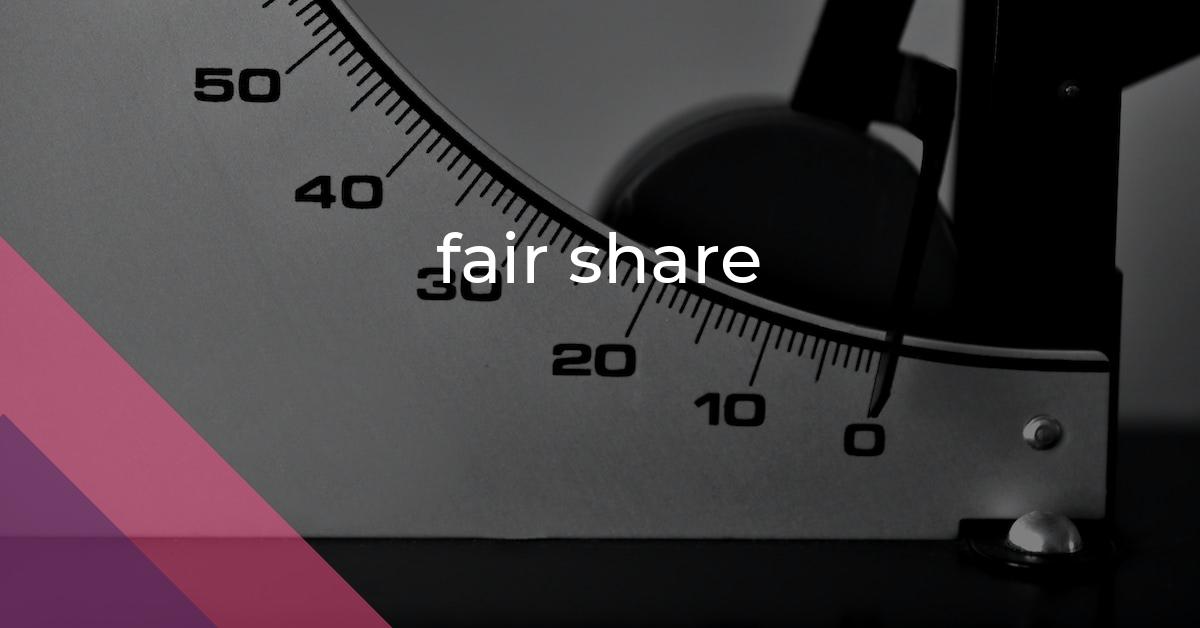fair share: Idiom Meaning and Origin
What does ‘fair share’ mean?
The idiom "fair share" means an equal or appropriate portion of something, often used in the context of dividing resources or responsibilities. It implies fairness and just distribution.

Idiom Explorer
The idiom "just deserts" means to receive the appropriate punishment or reward for one's actions.
The idiom "in the interest of justice" means to take action or make a decision based on what is fair and right, rather than personal gain or bias.
The idiom "hold up one's end" means to fulfill one's responsibilities or contribute one's fair share in a group or partnership.
The idiom "go halves" means to share the cost or responsibility of something equally with someone else.
The idiom "go halfsies" means to split the cost or share something equally between two people.
The idiom "give as good as one gets" means to respond with equal force or intensity when faced with aggression or criticism, not allowing oneself to be taken advantage of.
The idiom "fit the bill" means to be suitable or appropriate for a particular purpose or requirement.
The idiom "fair to middling" means average or mediocre, neither good nor bad.
It conveys the idea of fairness, where individuals or things are not being discriminated against or being treated unjustly.
Cracking the Equation
The idiom "fair share" is a common expression used in American English. It is typically used to discuss the equitable distribution of something, such as resources, responsibilities, or opportunities. The phrase implies that each person should receive or contribute their appropriate or reasonable portion. It is important to note that the term "fair share" is subjective and can vary based on context and individual perspectives.
The idiom "fair share" can be related to the idiom "go halves." When discussing the equitable distribution of resources or responsibilities, "fair share" emphasizes the importance of each person receiving or contributing their appropriate portion. Similarly, "go halves" suggests that two or more people should divide something equally or share the responsibility equally.
The origin of the idiom "fair share" is unclear, as it has been in use for a significant period of time. The phrase itself is a combination of the adjective "fair," meaning just and equitable, and the noun "share," which refers to a portion or division of something. The idiom is believed to have emerged from common usage and has become ingrained in the English language.
The idiom "fair share" can also be related to the idiom "fair and square." Both idioms emphasize the importance of fairness and equitable distribution. While "fair share" focuses on the appropriate portion that each person should receive or contribute, "fair and square" emphasizes the fairness and integrity of the distribution process itself.
When used in discussions about wealth or resources, "fair share" often refers to the concept of distributive justice. It suggests that resources should be divided proportionally and that individuals should receive an equitable portion based on various factors, such as need, contribution, or merit. The idiom can be employed to advocate for more equal distribution or to criticize perceived unfairness in how resources are allocated.
The idiom "fair shake" can also be related to the idiom "fair share." Both idioms emphasize the importance of receiving or providing an equitable opportunity or treatment. While "fair share" focuses on the equitable distribution of resources or responsibilities, "fair shake" emphasizes receiving or providing an equal and fair opportunity.
The idiom "fair share" is commonly used in social, economic, and political discourse. It is often employed in discussions about taxes, where individuals debate whether the wealthy are paying their fair share to support public services and initiatives. The idiom can also come up in debates about welfare programs, where different perspectives clash over the extent to which individuals should be responsible for supporting those in need.
The idiom "fair share" can also apply to personal responsibilities or obligations. It can be used to assert that individuals should do their part or contribute their appropriate share to a group effort or task. For example, someone may say, "Everyone should do their fair share of the work," to emphasize the importance of everyone pulling their weight and not shirking responsibilities.
The idiom "fair share" is a widely used expression in American English that speaks to the equitable distribution of something. It can be applied to discussions about resources, responsibilities, or opportunities. The phrase carries subjective connotations and arises in various contexts, such as wealth distribution or personal contributions. Although the specific origins of the idiom remain uncertain, its usage and significance have endured over time. The notion of a fair share continues to be a topic of ongoing discussion and debate, reflecting the complexities of fairness and the ever-evolving nature of society.
Example usage
Examples of how the idiom "fair share" can be used in a sentence:
- 1. She believes that everyone should pay their fair share of taxes.
- 2. The teacher ensured that each student received their fair share of the classroom supplies.
- 3. They divided the cake into equal pieces so that everyone could have their fair share.
More "Distribution" idioms



